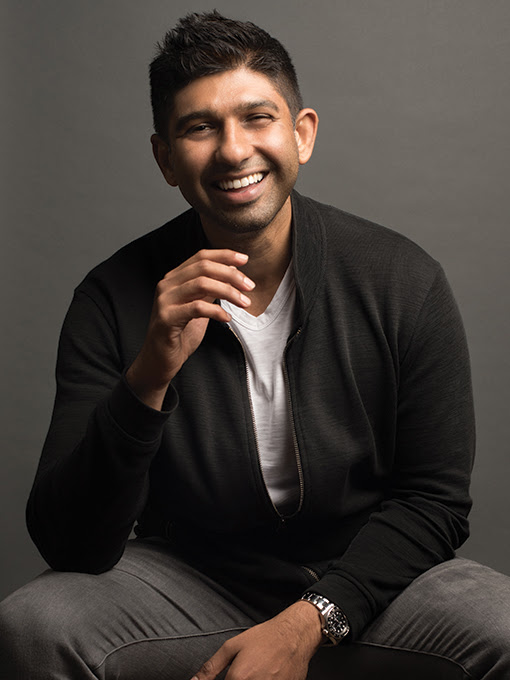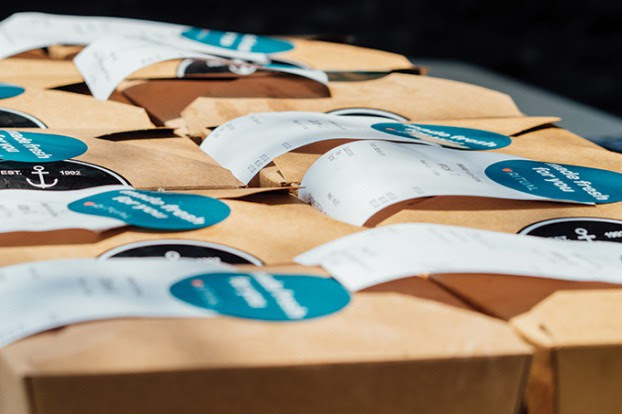How the company is investing in its future by building products that go beyond the meal ordering app.

The marble counter at my local lunch stop has a peculiar shape. I can’t quite decide if it was by design or out of necessity.
The far end draws my attention, not because there’s a mob of people eyeing boxes of glass noodles and greens in search of their name, having cleverly ordered ahead. No, I’m curious about the chunk of marble that’s conspicuously missing from the counter. It’s created a nook that holds just-made bowls ordered through meal-ordering apps like Ritual. Was its original purpose to display drinks on ice? I can’t be certain. But it’s drawing hungry nine-to-fivers like moths to a flame – of which I’m sure was deliberate.
My speculation was sparked by something Ritual’s co-founder and CEO Raymond Reddy said during an interview about what the 2019 Brand of the Year has learned to stand out among the many hopeful meal ordering apps that enable queue-skipping at local eateries. He tells me that restaurants are challenged just as much today as retailers were a decade ago, back when a tornado called technology left disruption in its wake. “[Today] when you add up all of the average restaurant’s digital sources; when you add up third-party delivery and Ritual, it makes up half of their business. More than half is digital, not walk-ins,” he says. Yet, “most stores today aren’t designed for digital-first.”
Reddy explains that this gap is why Ritual is pivoting. “During the first few years, we focused on the product for consumers. But now, half of the company is focused on building products for our [restaurant] businesses,” he says. “We pay a lot of attention to what the experience is like, which is why we have built a lot of products and have invested a lot into things that you wouldn’t even consider being technology.”
The app company is making its move into consultancy territory, where food halls in New York, for example, look to its team to design vertical shelving and store layouts. Reddy and his co-founders Larry Stinson and Robert Kim now sit in restaurant logistics and operations meetings, something the software developers – originally hailing from Silicon Valley where they worked at Google – likely never dreamed they’d do.

It helps to understand Ritual’s evolving business by going back to 2015, when the co-founders and high school pals first tested the app in a handful of workplaces in Toronto’s King St. West neighbourhood.
Four years of sweat and tears went into refining the platform. It was a very slow, very calculated approach. Reddy says the team used the advantages of a small, controlled operation to perfect the product until it was ready to scale, starting with only 50 local merchants signed onto its app. It wasn’t until two years later when Ritual expanded outside of Toronto – a far cry from the 15 cities it launched last quarter, bringing its presence to 40-plus global markets.
The company has raised US$127.7 million in venture capital funds during its four years, and today the app is used to help feed the bellies of “100,000 corporate teams and millions of customers,” according to Ritual’s website. Reddy says he credits all of the company’s success in 2019 “with the fact that we went slower and smaller than anyone thought we should have in 2015.”
While speed to market was taken at a safe pace, Reddy and his partners enjoy the thrill of a startup by embracing a high tolerance for failure. Tech co.’s, like Ritual, thrive in the assumption that version one of anything won’t work, he says, and uses its Piggyback as an example of a product that failed three times (starting at ground zero each time) before it finally clicked into place. The in-app tool essentially digitized the age-old coffee run: “guests” jump on an order made by a “host,” who then retrieves the team’s lunch in return for Ritual rewards – which, as an aside, makes it the biggest restaurant loyalty coalition of more than 5,000 eateries and coffee shops. Piggyback wasn’t something anyone could have asked for, says Reddy, but today more than 150,000 teams use the system in cities in North America, the U.K. and Australia.
From a wellness program that encourages people to eat healthier lunch options, to meal credits that employers can give staff, Ritual has created products for corporate offices to attract talent and build company culture. But twelve months ago, Reddy and his partners invested more time and recources into the restaurant side of its operations. With the platform becoming more scalable and expanding into new markets (Asia and Europe are next), the company is in a position to offer deeper data and analytics.
“Because people on Ritual can rate every order, we now have a feedback loop that never existed before,” says Reddy. “We can measure how many orders were made incorrectly, or if it was late, or if the person didn’t have a good experience picking up. Simple metrics like that have a huge impact on retention and repeat visits.”
Ritual’s dashboard for restaurant operators is sort of like the equivalent of Google Analytics. It helps businesses find and solve pain points, and feeds into Ritual’s own future-proofing plan. By helping restaurants improve their operations, the platform markets itself as a business partner – not just another meal-ordering app. It even has a dedicated ops team that monitors meal requests in progress and calls the restaurant with a fix if an order goes awry.
There are no fees for these services, because while “some businesses build products to make money, we need to make enough money to build products. If we can make it free and build a better experience then we should,” he says. Ritual does, however, make money by charging restos a fee for any new customers they acquire through the app. Partners are given a credit when they onboard people to the app, which helped drive user adoption – more so than PR ever did, “because we would tell the entire city about the product, but it would only work in one neighbourhood, so we just ended up disappointing people,” says Reddy.
While Ritual has become a lunch-crowd-pleaser, the co-founder says he’ll continue to look for growth beyond its app.
“Food was a great starting point because it’s something that’s a part of everyday lives. In the same way that Amazon started with books, they transformed that category,” says Reddy. “We have something that works in North America and the next five years will be about taking that formula and making it work across the world. [But] I think Ritual will eventually stand for more than just take-out from restaurants, and people will start to use us more broadly for different things.”


